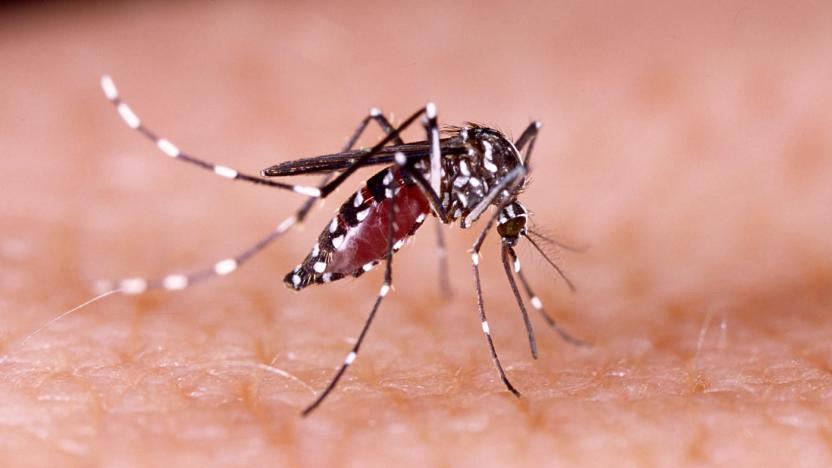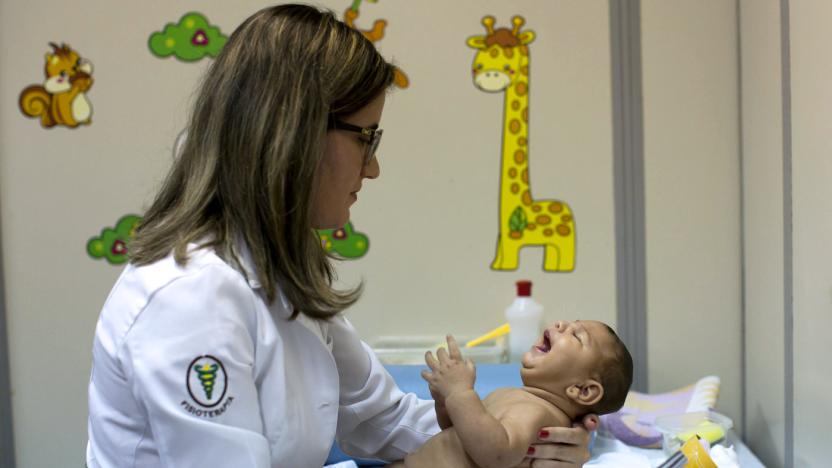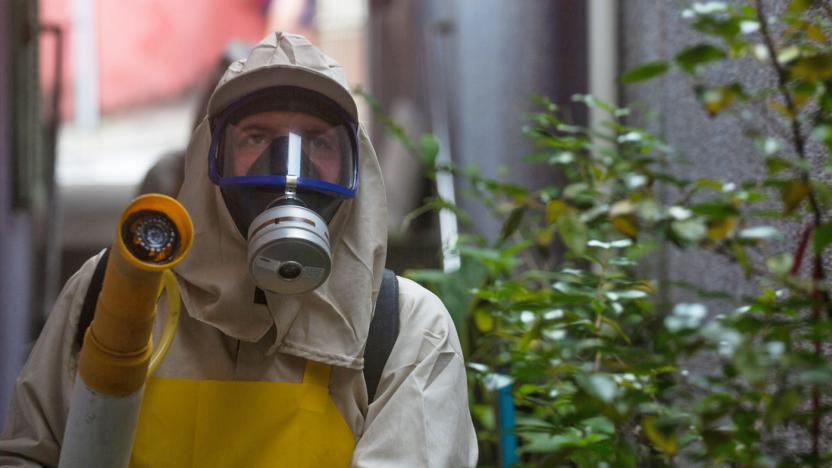ZikaVirus
Latest

ICYMI: Genetically-modified mosquitoes are coming
try{document.getElementById("aol-cms-player-1").style.display="none";}catch(e){}Today on In Case You Missed It: Voters in the Florida Keys may have passed a measure to use bioengineered mosquitoes to combat the Zika virus and Dengue fever, but it's still a battle to get a community to accept the insects. The FDA has approved use of altered bugs that are designed to mate, which would then result in offspring that would quickly die. You can get caught up on the back-and-forth, here.

CDC outlines how it'll cope with Zika outbreaks
The Centers for Disease Control and Prevention has published how it plans to tackle the Zika virus in the event of a domestic outbreak. While there are already cases of the virus in the US, these were contracted overseas and brought back by unwitting travelers. The agency believes, however, that certain breeds of mosquitos could spread the condition across the US, should they come into contact with a carrier. The plan outlines five stages of action, starting by simply monitoring mosquito patterns and controlling their populations as well as preparing emergency response teams.

Inhabitat's Week in Green: Hyperloop One's public test, and more!
The Hyperloop promises to one day transport passengers at blazing speeds -- and the technology just took a big step forward. This week Hyperloop One launched a cart from 0 to 166 miles per hour in 1.1 seconds in its first public test. In other futuristic transportation news, a European Space Agency incubator just unveiled the world's first flying car capable of vertical takeoff and landing. In Japan, there are now more electric vehicle chargers than gas stations. And researchers in Mexico have developed a new type of glowing cement that could light up dark highways.

IBM developed a 'magic bullet' to combat viral infections
IBM Research and the Institute of Bioengineering and Nanotechnology (IBN) in Singapore have created a new chemical "macromolecule" that could aid in the fight against a wide range of viral diseases like Ebola, Zika, dengue fever, herpes or even influenza. The new chemical was "designed from the ground up" to combat viruses in three ways: by preventing it from infecting healthy cells, stopping the virus's replication and finally boosting the body's immune system to help it fight the virus on its own.

ICYMI: Robots, disappearing medical skin and more
#fivemin-widget-blogsmith-image-336110{display:none;} .cke_show_borders #fivemin-widget-blogsmith-image-336110, #postcontentcontainer #fivemin-widget-blogsmith-image-336110{width:570px;display:block;} try{document.getElementById("fivemin-widget-blogsmith-image-336110").style.display="none";}catch(e){}Today on In Case You Missed It: We are rounding up a few interesting robot and car stories at the top of the show because simply too much happened since last week to just chose one. The University of North Texas drug-sniffing car needs a mention, and so does the US Army's new bomb bot. Also, researchers from MIT developed a gel that dries as a totally clear second skin. It could be used to do something as simple as smooth out wrinkles (see ya, botox!) or deliver topical medicine, covertly. And Harvard's Wyss Institute came up with a cheap way to test for the Zika virus; hopefully at-risk states take notice. If you like Rube Goldberg devices, this one with magnets and marbles might blow your mind. As always, please share any great tech or science videos you find by using the #ICYMI hashtag on Twitter for @mskerryd.

Inhabitat's Week in Green: Solar Impulse's trans-Pacific flight, and more!
The Solar Impulse airplane is on a mission to circle the globe using only the power of the sun, and this week it continued its journey by crossing the Pacific Ocean. Meanwhile, Tesla showed just how fast the Model S is by challenging a Boeing 747 to a drag race. An Italian company is turning vintage moped parts into some of the coolest electric bikes we've ever seen, and a Swedish cyclist created an all-weather bike that looks just like a car. And we've seen buses and vans turned into some pretty incredible things -- but Lee Broom's palatial gallery on wheels takes the cake.

ICYMI: Targeting Zika with tech, flexi-cam and more
#fivemin-widget-blogsmith-image-547051{display:none;} .cke_show_borders #fivemin-widget-blogsmith-image-547051, #postcontentcontainer #fivemin-widget-blogsmith-image-547051{width:570px;display:block;} try{document.getElementById("fivemin-widget-blogsmith-image-547051").style.display="none";}catch(e){}Today on In Case You Missed It: Brazil is taking on the Zika virus by creating a smart billboard that attracts, then kills mosquitoes. Columbia University researchers built a camera prototype that takes pictures at a curve. And a Chinese company has stepped to Tesla with a self-driving, electric-only vehicle, though it isn't in production yet. Definitely share the latest in the Volkswagen emissions scandal with your friends who could use $5,000 (but might not get it); or just take in this performance from Prince as he was inducted into the Rock & Roll Music Hall of Fame. He was just so talented. As always, please share any great tech or science videos you find by using the #ICYMI hashtag on Twitter for @mskerryd.

Billboard mimics human sweat to entrap Zika-carrying mosquitoes
A couple of ad agencies in Brazil installed two special billboards in Rio de Janeiro, which don't endorse any kind of good or service. Instead, these billboards were designed to lure and kill Zika-carrying mosquitoes. They attract any Aedes aegypti up to 2.5 miles away by emitting a solution containing lactic acid and carbon dioxide that mimic human sweat and breath, respectively. Once the mosquitoes flock to the billboards, they get sucked inside the glass panel, where they're trapped until they die.

Purdue researchers discover how Zika virus is structured
By now, you've probably heard of the Zika fever. You know, the mosquito-carried malady that's been declared an international health emergency and can trigger miscarriage for pregnant women or microcephaly in fetuses. Well, researchers from Purdue University have determined how the virus is structured -- an important step to understanding it and how to guard against the disease. Purdue says that through its research, the team discovered that Zika is structured a lot like other flaviviruses (West Nile virus, tick-borne encephalitis, Dengue virus) which could help speed treatment along.

Inhabitat's Week in Green: Tesla's most affordable EV, and more!
Tesla just announced plans to launch its most affordable electric car next month. The Model 3 is expected to cost $35,000 and is set to debut on March 31st -- but it already has competition. Chevrolet showcased the Bolt EV at the start of the year, and Volkswagen confirmed that it's working on the world's first mass-market electric car. Meanwhile, Google is developing electric cars that drive themselves, and soon they'll be able to charge wirelessly. In aviation news, Easyjet announced plans to trial the first hybrid hydrogen plane, and Elon Musk is considering building a vertical take-off and landing electric jet.

Zika virus declared an international health emergency
If it wasn't already patently clear that the Zika virus poses a serious threat, it is now. The World Health Organization has declared that Zika is a health emergency "of international concern," and that there needs to be "coordinated" response to both track and limit outbreaks. Effectively, it's a call to action -- countries and organizations are under pressure to devote research and funding toward fighting the mosquito-borne disease.





